Every day, we consciously use activities, lay out and play materials to help children discover the world. Math, organising and sorting, technology, science and media are part of this.
Building block in picture
Cognitive abilities
Coming up with solutions
Math
Numbers
Colours
Media literacy
Forms
Technique
(Natural) science
With this building block, children develop or learn:
For children the bridge between the digital and physical world is small. Our role is to help and guide children through the use and benefits of media, digital assets and devices and to ensure a healthy balance. For us, physical play is paramount, but we are increasingly combining it with digital media with children from the age of two. For example, practicing dance moves together, watching a tutorial or reading a digital picture book. When a toddler asks us how a giraffe drinks, we look for a video. This is how we discover the real world with a digital tool. And we pay attention to media literacy. We give children room to discover and ensure that they use media that are appropriate for their age and development. We know if the content is suitable. Just like we know when reading a book or listening to music.
Digitally savvy and secure
This building block incorporates subjects such as science, spatial awareness, technology, math and numbers, language and thinking. There are many skills that children need in this day and age, like self-regulation, creativity, working with people from different backgrounds, communicating, problem-solving, critical thinking and digital literacy. Childcare is pre-eminently a place where the development of these skills is discussed extensively. For example, during an outdoor activity, a toddler discovers how to make mud from water and sand and that a bucket full of mud is much heavier than a bucket full of sand. And during a technical activity a 9-year-old experiences that it takes a lot of precision to make a good periscope, with which he can secretly watch his friends, without them noticing. By counting the number of children sitting at the table or the number of colours you colour with, a toddler is doing math. Fitting one box into another is an experience of small, bigger, biggest.
Engineering and science
Discovering through play stimulates your entire brain. Not only math, numbers and science, but also creativity and spatial awareness are part of this. And even your social skills. By experiments or playing with open-ended toys or loose parts, we get to work on this. And by learning more about online and offline technology, digital skills get a boost as well.
Wise & Discover

Cognitive abilities
Coming up with solutions
Math
Numbers
Colours
Media literacy
Forms
Technique
(Natural) science
With this building block, children develop or learn:

Discovering through play stimulates your entire brain. Not only math, numbers and science, but also creativity and spatial awareness are part of this. And even your social skills. By experiments or playing with open-ended toys or loose parts, we get to work on this. And by learning more about online and offline technology, digital skills get a boost as well.
Wise & Discover
For children the bridge between the digital and physical world is small. Our role is to help and guide children through the use and benefits of media, digital assets and devices and to ensure a healthy balance. For us, physical play is paramount, but we are increasingly combining it with digital media with children from the age of two. For example, practicing dance moves together, watching a tutorial or reading a digital picture book. When a toddler asks us how a giraffe drinks, we look for a video. This is how we discover the real world with a digital tool. And we pay attention to media literacy. We give children room to discover and ensure that they use media that are appropriate for their age and development. We know if the content is suitable. Just like we know when reading a book or listening to music.
Digitally savvy and secure
This building block incorporates subjects such as science, spatial awareness, technology, math and numbers, language and thinking. There are many skills that children need in this day and age, like self-regulation, creativity, working with people from different backgrounds, communicating, problem-solving, critical thinking and digital literacy. Childcare is pre-eminently a place where the development of these skills is discussed extensively. For example, during an outdoor activity, a toddler discovers how to make mud from water and sand and that a bucket full of mud is much heavier than a bucket full of sand. And during a technical activity a 9-year-old experiences that it takes a lot of precision to make a good periscope, with which he can secretly watch his friends, without them noticing. By counting the number of children sitting at the table or the number of colours you colour with, a toddler is doing math. Fitting one box into another is an experience of small, bigger, biggest.
Engineering and science
Every day, we consciously use activities, lay out and play materials to help children discover the world. Math, organising and sorting, technology, science and media are part of this.
Building block in picture